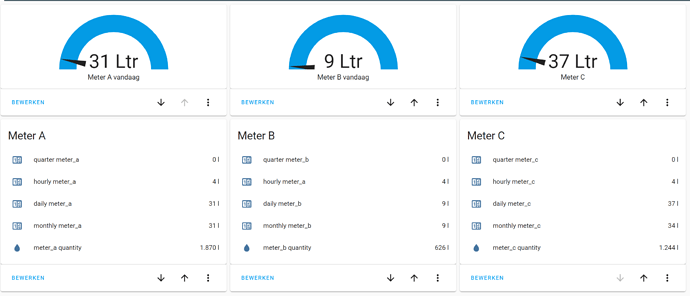Marchel
December 13, 2021, 2:32am
1
Beginner question:
I have two sensors A and B.
How do I do that?
Do I have to enter the calculation
I do want to keep the calculated value C in the database
I have below code.
sensor`:
- platform: rest
name: Meter_A
json_attributes:
- waterquantity
resource: http://192.168.0.101/water.html
- platform: rest
name: Meter_B
json_attributes:
- waterquantity
resource: http://192.168.0.100/water.html
utility_meter:
hourly_Meter_A:
source: Meter_A_quantity
cycle: hourly
hourly_Meter_B:
source: Meter_B_quantity
cycle: hourly
*hourly_Meter_C:*
* source: Meter_C_quantity*
* cycle: hourly*
tom_l
December 13, 2021, 3:43am
2
Use a template sensor.
template:
- sensor:
- name: "Your Sensor Name Here"
unit_of_measurement: "your_unit_here"
state: "{{ states('sensor.your_sensor_a_here')|float(0) - states('sensor.your_sensor_b_here')|float(0) }}"
Marchel
December 13, 2021, 12:11pm
3
Thank you for your help.
I had tried this solution, but it doesn’t seem to work with the utility meter_C.
Utility meter_A and B indicate the correct value.
sensor`:
- platform: rest
name: Meter_A
json_attributes:
- waterquantity
resource: http://192.168.0.101/water.html
- platform: rest
name: Meter_B
json_attributes:
- waterquantity
resource: http://192.168.0.100/water.html
template:
- sensor:
name: meter_C
state: '{{(states.sensor.meter_A.attributes["waterquantity"] | float | round(0))- (states.sensor.meter_B.attributes["waterquantity"] | float) | round(0)}}'
state_class: "measurement"
unit_of_measurement: "l"
icon: "mdi:water"
utility_meter:
hourly_Meter_A:
source: Meter_A_quantity
cycle: hourly
hourly_Meter_B:
source: Meter_B_quantity
cycle: hourly
hourly_Meter_C:
source: Meter_C_quantity
cycle: hourly
tom_l
December 13, 2021, 12:22pm
4
Entity ids only contain lower case letters. Also use this format to prevent errors if the sensor is not initialised:
template:
- sensor:
name: Meter_C
state: "{{ ( state_attr('sensor.meter_a', 'waterquantity')|float(0) - state_attr('sensor.meter_b', 'waterquantity')|float(0) )|round(0) }}"
state_class: "measurement"
unit_of_measurement: "l"
icon: "mdi:water"
https://www.home-assistant.io/docs/configuration/templating/#states
Also your source entity ids are not correct for your utility metres:
utility_meter:
hourly_Meter_A:
source: Meter_A_quantity # What is this?
You need to provide a valid entity id there.
Marchel
December 13, 2021, 2:14pm
5
I still have a lot to read and learn!
The quantity sensors from meter A,B and C are correct (1870 - 626 = 1244 ).
For now only the quarter-hourly and hourly sensors are representative.
sensor:
- platform: rest
name: meter_a
json_attributes:
- waterquantity
resource: http://192.168.0.101/water.html
- platform: rest
name: meter_b
json_attributes:
- waterquantity
resource: http://192.168.0.100/water.html
template:
- sensor:
name: "meter_a quantity"
state: "{{ ( state_attr('sensor.meter_a','waterquantity')|float(0)|round(0)) }}"
state_class: "measurement"
unit_of_measurement: "l"
icon: "mdi:water"
- sensor:
name: "meter_b quantity"
state: "{{ ( state_attr('sensor.meter_b', 'waterquantity')|float(0)|round(0)) }}"
state_class: "measurement"
unit_of_measurement: "l"
icon: "mdi:water"
- sensor:
name: "meter_c quantity"
state: "{{ ( state_attr('sensor.meter_a', 'waterquantity')|float(0) - state_attr('sensor.meter_b', 'waterquantity')|float(0) )|round(0) }}"
state_class: "measurement"
unit_of_measurement: "l"
icon: "mdi:water"
utility_meter:
quarter_meter_a:
source: sensor.meter_a_quantity
cycle: quarter-hourly
name: quarter meter_a
hourly_meter_a:
source: sensor.meter_a_quantity
cycle: hourly
name: hourly meter_a
quarter_meter_b:
source: sensor.meter_b_quantity
cycle: quarter-hourly
name: quarter meter_b
hourly_meter_b:
source: sensor.meter_b_quantity
cycle: hourly
name: hourly meter_b
quarter_meter_c:
source: sensor.meter_c_quantity
cycle: quarter-hourly
name: quarter meter_c
hourly_meter_c:
source: sensor.meter_c_quantity
cycle: hourly
name: hourly meter_c
daily_meter_a:
source: sensor.meter_a_quantity
cycle: daily
name: daily meter_a
daily_meter_b:
source: sensor.meter_b_quantity
cycle: daily
name: daily meter_b
daily_meter_c:
source: sensor.meter_c_quantity
cycle: daily
name: daily meter_c
monthly_meter_a:
source: sensor.meter_a_quantity
cycle: monthly
name: monthly meter_a
monthly_meter_b:
source: sensor.meter_b_quantity
cycle: monthly
name: monthly meter_b
monthly_meter_c:
source: sensor.meter_c_quantity
cycle: monthly
name: monthly meter_c
tom_l
December 13, 2021, 9:26pm
6
You can’t use the utility meter for C. That gives a running total. All you want is the difference between Utility meters A and B. Use template sensors to do this.
Marchel
December 13, 2021, 11:32pm
7
Thank you very much Tom,
I get what you mean and I have it working now
1 Like


 .
.